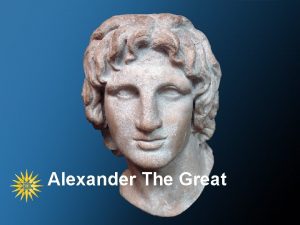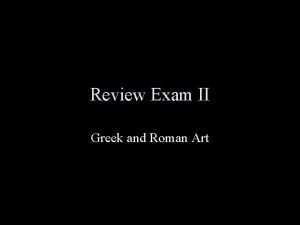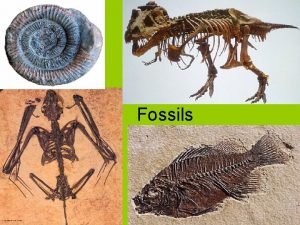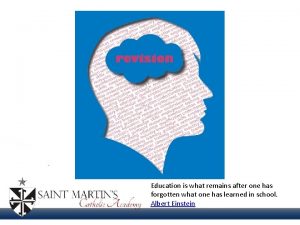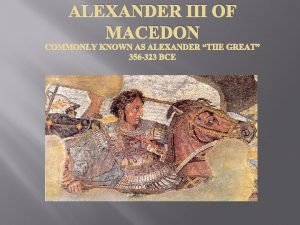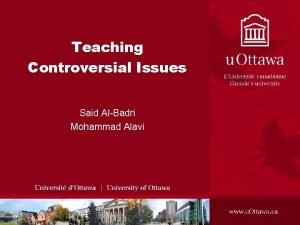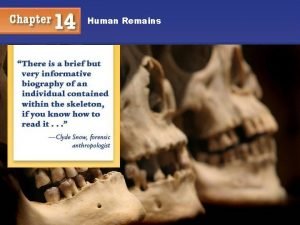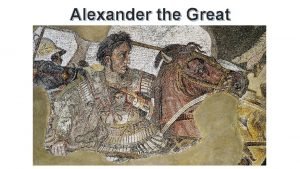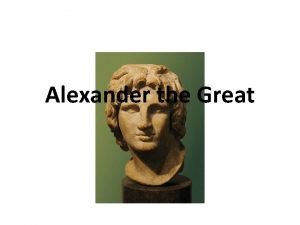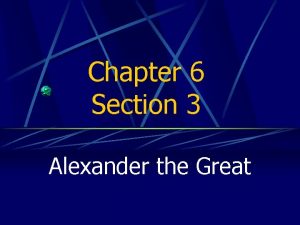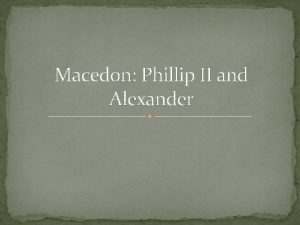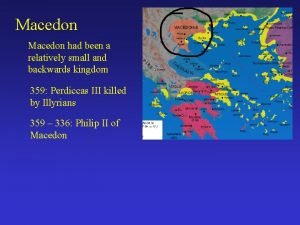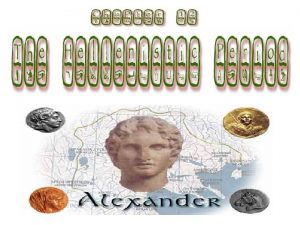Alexander III of Macedon Alexander remains a controversial













- Slides: 13

Alexander III of Macedon Alexander remains a controversial figure. He was reputed to have murdered hundreds of thousands to achieve his power, yet his admirers see him as a creative genius who aimed at forging a unified Greco. Persian culture that extended into central Asia.

By some he was called Alexander the Great; by others Alexander the Accursed.

Was Alexander a hero or villain? • Time to TOAST or ROAST! • Reach under your chair to see if you have a “purple” toast or roast to read to the class about Alexander.

1. “Alexander introduced Greek culture into large parts of Asia. His conquests were instrumental in spreading a social philosophy of the Brotherhood of Man, bringing together Greeks and Persians, the conquered with the conqueror. ” -William Tarn, Alexander the Great

2. “Alexander’s all absorbing obsession through a short but crowded life, was war and conquest. It is ridiculous to think that he dreamed of wading through rivers of blood and violence to achieve the Brotherhood of Man by raping an entire continent. He spent his whole life, with legendary success, in the pursuit of personal glory. The empire he built collapsed the moment he was gone, he came as a conqueror and the work he wrought was destruction. ” – Peter Green, Alexander of Macedon

3. “Gradually a blending of eastern and western cultures occurred. Alexander had encouraged this blending when he married a Persian woman and urged his soldiers to follow his example. He had also adopted many Persian customs, including Persian dress. After his death, a vital new culture emerged which blended Greek, Persian, and Indian influences. This Hellenistic civilization would flourish for centuries. ” - Howard Spodek, The World’s History

4. “Alexander treated the people and territories he conquered in a cruel and disrespectful manner. For example, when he attacked Tyre (TY-ur), a city belonging to the Persian Empire, the citizens fought back strongly for eight months. When Alexander finally captured the city, he was so furious that he sold most of the city’s 30, 000 people into slavery. During another battle, Alexander and his troops pursued the retreating Persian army for many hours and slaughtered nearly 40, 000 men. Finally, Alexander captured the Persian capital of Persepolis (pur-SEP-oh-liss) without opposition. He was now the conqueror and ruler of all Persia. Despite the advice of even his closest aides, Alexander stole, or plundered the city’s greatest riches for himself. Then, in a drunken state, he allowed his men to burn down the Great Palace and its surrounding temples. Alexander thus destroyed a magnificenter of Persian culture, traditions, and artistic achievements. Although some people praised Alexander for his respect for other cultures, the Persians saw firsthand the other side of his nature - a vengeful conqueror whom often had a total disregard for the traditions, customs, and beliefs of another people. ” - Teachers’ Curriculum Institute, Ancient Greece

5. “Paintings, statues, and legal codes show that women were no longer restricted to their homes during the Hellenistic period (period of the blending of Greek, Persian, Egyptian, and Indian influences). More women learned to read and write. Some became philosophers or poets. Royal women held considerable power, working alongside husbands and sons who were the actual rulers. In Egypt, the able and clever queen Cleopatra came to rule in her own right. ” – Howard Spodek, The World’s History

6. “By the time the battle was over, 6, 000 Thebans had been killed. In addition, Alexander sold more than 20, 000 citizensmostly women and children-into slavery. Then he ordered his troops to destroy every building in the city, with the exception of a few temples. Once again the Thebans were crushed without mercy. ” - Teachers’ Curriculum Institute, Ancient Greece

7. “To facilitate travel and commerce, as well as conquest and administration, Alexander built roads, canals, and whole new cities, including at least sixteen Alexandria’s across the length and breadth of his conquests, using gold and silver captured from Persia to finance many of these constructions. The most famous and illustrious Alexandria was the metropolis in Egypt, which became the leading city of its day. Egyptian Alexandria housed palaces, administrative centers, theaters, stadia, the greatest library of Greek knowledge, containing 700, 000 manuscripts, and the final resting place of Alexander himself. ” - Howard Spodek, The World’s History

8. “Alexander exhibited tremendous personal bravery. He was always at the front and always in the thick of battle. Generals in pre-modern times usually led their men rather than commanding from behind. This, of course, placed the General in great jeopardy. Alexander was wounded in the neck and head at Granicus River, in the thigh at Issus, the shoulder at Gaza. He suffered a broken leg in Turkestan, was wounded on three occasions in Afghanistan, and, most severely, had his lung pierced by an arrow in India. He more than once was the first man over the wall at the storming of a city. - E. L. Skip Knox, History of Western Civilization

9. “Alexander never lost a battle. As the victories accumulated, his men came to believe that he was invincible. So did his enemies. Like other great generals, he knew and loved his men. He remembered their names and deeds, calling them by name when he would speak to them before a battle, citing their heroic acts. His veterans he sent home for a rest to Greece, allowing them to visit their families. He was generous in his gifts and honors. All of these factors created an army that simply could not be stopped. Its accomplishments so far eclipsed anything that had ever been done, Alexander and his Macedonians entered into legend. ” - E. L. Skip Knox, History of Western Civilization

10. “Bucephalus was Alexander’s horse throughout most of his career. Some horse traders had brought this magnificent animal to King Philip and offered him for sale, but no man could ride him. The traders were taking Bucephalus away when Alexander remarked that it was a shame to lose such a fine horse just because no one knew the right way to manage him. Philip at first ignored the boy, but Alexander persisted. Finally Philip said: ‘Do you presume to criticize those who are older than you, as if you knew more, and could do better? ’ Alexander boldly declared that he would ride the horse, and everyone laughed. He bet the price of the horse, and got the chance to try. Alexander had noticed that Bucephalus was afraid of his own shadow, so he turned the horse to face the sun and settled him down, then walked him in that direction for a while, stroking him whenever he became eager and fiery. Suddenly, Alexander jumped on his back and drew in the bridle gently, but firmly, until all rebelliousness was gone. Then he let Bucephalus go at full speed, urging him on with a commanding voice. Alexander’s father and the others looked on nervously until they saw Alexander turn at the end of his run and come back in triumph. ‘Oh my son, ’ said King Philip with tears in his eyes, ‘find yourself a kingdom equal to and worthy of yourself, for Macedonia is too little for you. ’ After this, Philip sent for Aristotle to be Alexander’s tutor. Ordinary teachers would not be enough for Alexander, who could easily be led by reason but refuse to submit to compulsion. – Plutarch, Alexandros
 Phillip of macedon
Phillip of macedon Controversial issues in sport
Controversial issues in sport Why is pharming controversial
Why is pharming controversial Hamlet act iii scene iii
Hamlet act iii scene iii Apollo with battling lapiths and centaurs
Apollo with battling lapiths and centaurs Major minor static and dynamic flat are the types of
Major minor static and dynamic flat are the types of Different types of fossils
Different types of fossils Original remains examples
Original remains examples What is fossil
What is fossil Well myself and somebody else
Well myself and somebody else Thousand times i failed
Thousand times i failed What are original remains
What are original remains Remains annotations
Remains annotations Education is what remains after one has forgotten meaning
Education is what remains after one has forgotten meaning
